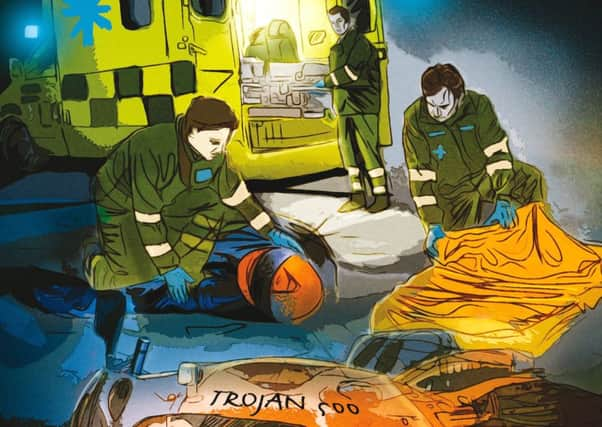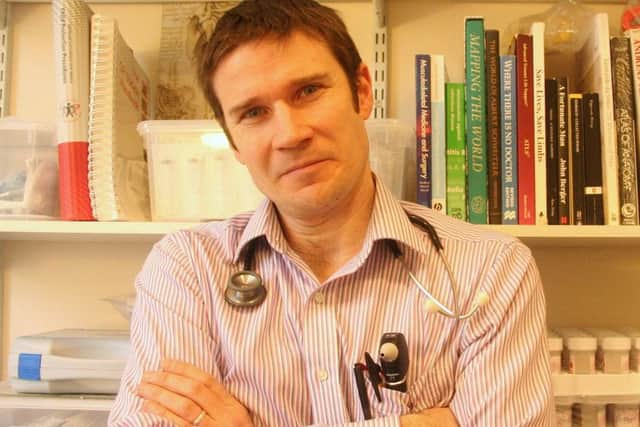The Write Stuff: Adventures in Human Being by Gavin Francis


But what are men, but leaves that drop
from their branches to the earth?
Apollo’s speech, The Iliad, Book XXI, v 540


Training in emergency medicine often felt like being awash in a sea of humanity; my pocket textbook a pilotbook for mariners. The departments themselves were often windowless as the engine room of a ship, and the staff moved in shifts just like deck officers on watch. Signing up for the training was a bit like enlisting in the Marines: the strict hierarchy of the medical staff, their bleached uniforms, their codes of behaviour, the alcoholic blowouts after hours.
On one afternoon shift it was sunny outside, but deep in the department there was only artificial light. A radio screamed an alert that an injured motorcyclist was on his way in by ambulance. The ambulance paramedic, Harry, let us know that although the biker was breathing and conscious his shoulder and chest had been badly injured. Harry was someone I’d come to know well in that department: battle-hardened, cynical but tremendously skilled at trauma life support.
Advertisement
Hide AdA few minutes after the radio call, Harry hurried into the room pushing the patient ahead of him. The biker had a moonish pallor to his face, and crew-cut black hair. I noticed first his rigid plastic collar, then his oxygen mask, then, with relief, that he was breathing for himself. Harry had slashed open the left sleeve of his leather jacket to fit a blood pressure cuff and an IV drip. He’d splinted the right arm because its position looked wrong – the right hand hung limply at an angle, like a snapped lance. “Chris McTullom,” Harry said, “25 years old.”
“He lost it on a bend, going 40 or 50 I’d say. Hit the siding and went over the handlebars. There was a pillar by the side of the road – I reckon he went onto it with his shoulder.”
“How long did he lie?” I asked.
“Just 10 or 15 minutes.”
“Any sign he’s lost blood?”
He shook his head. “None. He’s had a litre of fluid IV, blood pressure is 100 over 60, pulse is 110 – no wounds. He’s a lucky lad.”
“Has he said anything yet?”
“Not much. Coma Scale is 11, pupils fine.”
I looked down at Chris and began to check him over: neck immobilised, breathing well and plenty of oxygen getting into his lungs. His pulse was fast but with good volume and there was no blood leaking onto the sheets.*
His fingertips on the left were pink and warm. I yelled in his ear, ‘CHRIS!’, and his eyes opened, but then closed again. “How is the bike?” he moaned suddenly, “My bike…”
He wouldn’t squeeze my fingers when I asked him to, but when I pushed a pen hard down on his nail bed to check his responsiveness he pulled his hand away, swore and tried to punch me with his good arm. From being pale and expressionless his face began to boil with violence.
“GCS is 12 or 13 now – he seems to be coming round.”
Advertisement
Hide AdMcTullom was straining with anger now, trying to get up and off the table, but unable to for the pain in his arm and the restraints on his head and neck. With Harry’s help I held him down and gave him an injection of morphine.
He fell back into a doze, and we were able to cut through the protective armour of his jacket’s right sleeve. There was no blood on his T-shirt, but his right shoulder looked distorted – instead of being muscled and square as it was on the left, it was a pulpy, swollen diagonal. Harry was right: he must have hit the pillar with his shoulder, slamming his weight onto the collarbone. Once he had been tranquillised by morphine we rolled him carefully on his left side while maintaining the straightness of his spine, to see if he had any other injuries of his vertebral column. All normal.
Advertisement
Hide Ad“Can you feel me touching your hand?” – I began stroking the fingers of his left hand. His teeth were gritted, but he tried to nod – an impossibility in a hard collar. “Don’t nod, just say uh-huh if you can feel me.”
“Uh-huh.”
“What about here?” I began to touch his fingers on the right. Nothing.
“And here?” I began to touch his arm higher up, towards the elbow, then the swollen shoulder. Nothing – he couldn’t feel me touching the skin. “Can you bend your fingers?” I asked, putting my own fingers into his right palm. There was a slight flicker as he tried to make a fist. “Good. And bend your arm?” Nothing. The rage he’d shown just a few minutes before was starting to give way to a drowsy, drug-addled fear.
“What do you do for a living?” I asked him.
“Soldier,” he said. “A gunner…”
When the X-rays came they showed that his right collarbone was smashed into pieces. There’s a fine network of nerves behind the collarbone, emerging from the neck and controlling movement and giving sensation to the arm. He hadn’t just broken up his shoulder in the crash; he’d paralysed his right arm.
HUMAN culture evolves with the drama of history, but our anatomy, and the limitations it imposes on us, remains the same. Homer’s Iliad was first written down almost 3,000 years ago, describing a Greek siege of the city of Troy that may have taken place several centuries earlier than that. In Book VIII there’s a scene of heavy fighting – Teucer the master-archer is bringing down a slew of Trojans, and being cheered on by his king, Agamemnon. “I’ve shot eight arrows, and killed eight young warriors so far,” says Teucer, “but there is one mad dog I cannot hit.” The “mad dog” is Hector, a prince of the Trojans. The next passage is worth quoting in full:
Hector jumped down from his chariot with a loud cry, picked up a great stone, and ran straight for Teucer in fury. Teucer took an arrow from his quiver and laid it upon his bow, but before he could take aim and fire Hector struck him with the mighty stone; he hit him on the collarbone, where it divides the neck from the chest – a deadly place. His hand and wrist were numbed by the blow, and as he fell forward onto his knees, the bow fell from his hand.
Advertisement
Hide AdTeucer’s brother Ajax runs forward and stands over the fallen man, shield aloft, to protect him from a rain of arrows. Two more of his comrades run over and lift him, “groaning in pain” back to the safety of the Greek ships.
The author of The Iliad was a surprisingly accurate observer of anatomy. The battlefields of antiquity must have been chaotic places, sprawling with bodies and mired in blood. The warriors and camp-following poets were familiar with what is now called “major trauma”, and may have developed their own trauma care. There are some medically qualified Homer enthusiasts who have gone so far as to propose him as an early battlefield medic. Repeated through The Iliad are careful accounts of spear wounds, arrow strikes and sword blows, which take care not just to describe the part of the body that has been wounded, but the physiological effects of those wounds and, on occasion, specific treatments.**
Advertisement
Hide AdWhen Hector paralyses Teucer’s arm by hitting him “where the collarbone divides the neck from the chest” it’s an accurate description of a trick still used by martial arts experts today – the Brachial Stun. A blow to this area may not just temporarily paralyse the arm: if it causes pressure on part of the carotid artery it can trigger a reflex slowing of the heart. In sensitive individuals the heart can slow to such a degree that the victim falls unconscious. There are innumerable brachial stuns available to view on the internet – home videos of US Marines practising on one another in their barracks, black belts filmed in the ring, even police offcers attacking their suspects. Watching them, I thought of Teucer crumpling to the ground with his numb, lifeless arm.
THERE are various degrees of nerve injury. If the nerves behind the collarbone have been wrenched out of the spinal cord itself, there is almost no chance of recovery. If they’ve been ruptured there’s a small chance that some may heal, and nerve transplants sometimes help regain some weaker function. Nerves are in some respects similar to copper wiring surrounded by plastic insulation sheathing: a nerve that has been severely stretched may regrow if its outersheath has remained intact and only the inner “axon”, corresponding to the copper of the wire, has split.
Two months after his motorbike crash I saw Chris McTullom waiting in line for the neurosurgical review clinic. He still carried his right arm in a sling. The muscles of his upper arm that had been so pulpy and swollen were now withered and limp, but he had regained some movement in them.
“How are you getting on?” I asked him.
He took his arm from the sling, and slowly flexed his biceps. “It’s coming back,” he said. “I’m not fit for duty yet, but perhaps in another couple of months.”
“And what then?” I asked him.
“Back to my unit,” he said. “Afghanistan, probably.” He slowly curled the fingers of his right hand, stiff with disuse, as if to take hold of a trigger.
* You can bleed to death internally without a drop spilling onto the floor: pelvic fractures, femoral fractures or bleeding into the chest or abdomen can all cause enough internal blood loss to threaten life.
Advertisement
Hide Ad** But as the classicist KB Saunders noted dryly, “I do not expect every wound described by Homer to be realistically explicable. One should try to come to some physical explanation of events if possible. But miraculous things do happen in The Iliad… miraculous wounds should not be a surprise to us”; Classical Quarterly 49(2) (1999), 345–63.